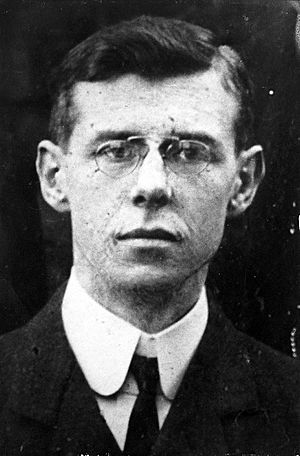Francis Arthur Bainbridge facts for kids
Quick facts for kids
Francis Arthur Bainbridge
|
|
|---|---|
 |
|
| Born | 29 July 1874 Stockton-on-Tees, England
|
| Died | 27 October 1921 (aged 47) London, England
|
| Occupation | Physiologist |
Francis Arthur Bainbridge (born July 29, 1874 – died October 27, 1921) was an English scientist who studied how the human body works. He was known as a physiologist. A physiologist is someone who studies the normal functions of living things.
Contents
Early Life and Education
Francis Bainbridge was born in Stockton-on-Tees, England, in 1874. He went to The Leys School before attending Trinity College, Cambridge. He studied there from 1893.
He earned his first degree in 1896. Later, he received a medical degree in 1901. He then completed his doctorate in 1904.
Career in Science
Even though he studied medicine, Francis Bainbridge found his true passion in other areas. He became very interested in Pathology and Bacteriology. Pathology is the study of diseases. Bacteriology is the study of bacteria.
In 1905, he started teaching Pathology at Guy's Hospital. Two years later, in 1907, he joined the Lister Institute. There, he worked as an assistant Bacteriologist.
Research on Food Poisoning
Bainbridge became well-known for his work on bacteria that cause food poisoning. His research helped us understand these tiny organisms better. He even gave lectures about his findings at the Royal College of Physicians.
Becoming a Professor
In 1911, Bainbridge became a professor of physiology at Durham University. This meant he was teaching and researching how the body works. Later, in 1915, he moved to St. Bartholomew's Hospital. He became the head of physiology there and stayed for the rest of his life.
The Bainbridge Reflex
Francis Bainbridge is most famous for discovering something important about the heart. This discovery is now called the "Bainbridge reflex" after him.
He found that when more blood flows into the right side of the heart, the heart beats faster. This happens because of special signals sent to the heart.
Contradicting Marey's Law
Bainbridge's discovery was interesting because it went against an older idea. This idea was called "Marey's Law." It was proposed by a French scientist named Étienne-Jules Marey in 1861.
Marey's Law suggested that if blood pressure went up, the heart rate would slow down. But Bainbridge showed that in some cases, like when the right side of the heart filled with more blood, the heart rate actually increased.
Other Important Studies
Bainbridge also made other valuable contributions to science. He studied how lymph is formed in the body. Lymph is a fluid that helps remove waste and fight infections.
He also researched how the kidneys filter blood. Specifically, he looked at the glomeruli, which are tiny filters inside the kidneys.
His Books
Francis Bainbridge wrote several important books. Two of his most popular ones were "Essentials of Physiology," published in 1914, and "Physiology of Muscular Exercise," which came out in 1919. These books helped teach others about how the body functions.
Recognition
Because of his important work and discoveries, Francis Bainbridge was recognized by other scientists. He was elected a Fellow of the Royal Society in May 1919. This is a very high honor for scientists in the United Kingdom.
 | Emma Amos |
 | Edward Mitchell Bannister |
 | Larry D. Alexander |
 | Ernie Barnes |

